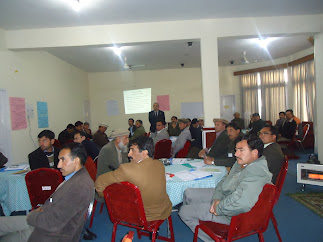
The term refresher is a concept of in-service teacher training in the educational process. It is defined as training that is designed to transform teachers’ obsolete knowledge and skills preparing them to be well-suited in an environment of new and updated knowledge, skills, and techniques of teaching and learning process. In many countries, teacher training is not based on research findings. Therefore, teachers do not benefit from the research studies in the field. Looking at the situation of a gap between the teacher training and research findings, refreshers can be used to fill this gap addressing the need to benefit the teachers from research studies. In educational settings, evaluation procedures are based on traditional approaches rather than empirical research studies.
As result, teachers are unaware of the relevant strategies
of evaluation and they are unable to solve the problems related to their
subject areas of teaching. Lack of application of research-based solutions to
problems in education leads towards creating a significant difference between
the teachers’ practices and the practices of other professions where research-based
knowledge is applied. This difference makes educational research and
development a complex process towards contributing to solving educational
problems. Thus, the gap between theory and practice widens. The solution to
fill this wider gap between theory and practice is teacher refresher courses by changing teachers’
existing beliefs, attitudes, and practices regarding teaching and learning.
Teacher refresher strategies
Refresher courses are carried out using three types of common strategies such as dissemination of information, sensitization, and cooperative research studies. Dissemination of information is made through various means such as expository speeches, print media, and electronic media which are commonly used by all the teachers. In order to benefit at the maximum level, the audience who receives the information is trained enough to absorb the information and have a sufficient level to understand the meaning of the information.
In sensitization, the teachers are provided with the information and opportunities to discuss the information in the form of seminars. In this strategy of a refresher, group discussion involving participants supervised by the trainer is thought to be effective. Teachers avail themselves of an opportunity to discover new facts, ideas, models, methods, and techniques that contribute to their changing professional practices. The third strategy is cooperative research work which is important and effective to transform teachers by changing their behavior.
Teachers are provided with the opportunities to solve their classroom problems using the findings of research studies. Cooperative research works include empirical research and action research which impact long lasting practices to be applied in teaching and learning.
Suggested
measures to make teacher refreshers more effective
In order to make the teacher
refresher course more effective, the following measures are suggested for desired results of in-service training.
i. The programs related to teacher refresher courses need to be planned on need-based after carrying out a needs analysis of the educational setting. On the basis of needs assessment, clear and explicit
objectives need to be set to achieve by the end of the program.ii.
The teacher refresher should be tailored in
such a way that the need of the school, as well as the students, could be met.
The trainers need to be well qualified and experienced to create a learning
environment in schools.
iii.
The content needs to
be more practical and relevant for transforming teachers in the true sense so
that the students could be benefited. Student-centered teaching
methodologies, a variety of resources should be used.
iv.
The groups of participants should be selected such a way they have the same subject areas
to teach in the classroom.
v.
For better impact, regular and frequent
teacher refresher courses should be arranged.
vi. It
needs to be attempted to address the needs of different prior levels of
trainees in terms of competence, proficiency, and skills.
vii.
Participatory action research should be
introduced, given importance on it and emphasis needs to be put to conduct in
real classroom situation.
viii. A mechanism to follow up needs to be designed and strictly applied to find the impact of refresher courses.

0 Comments
Post a Comment